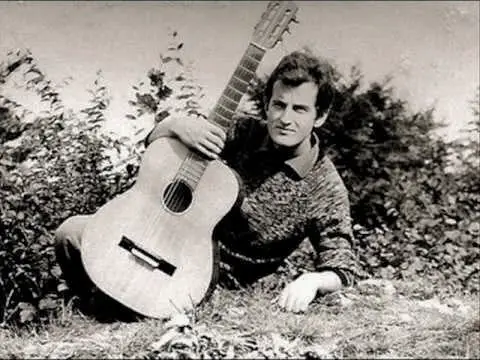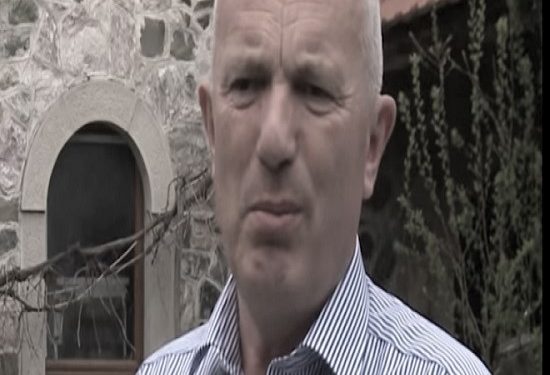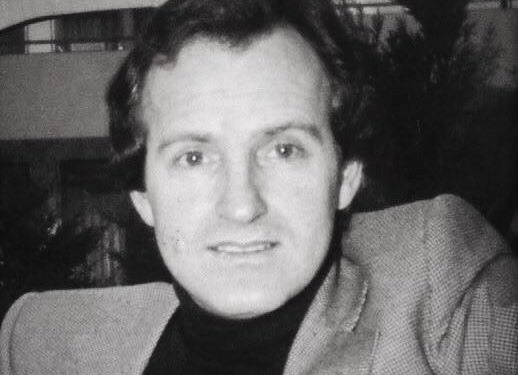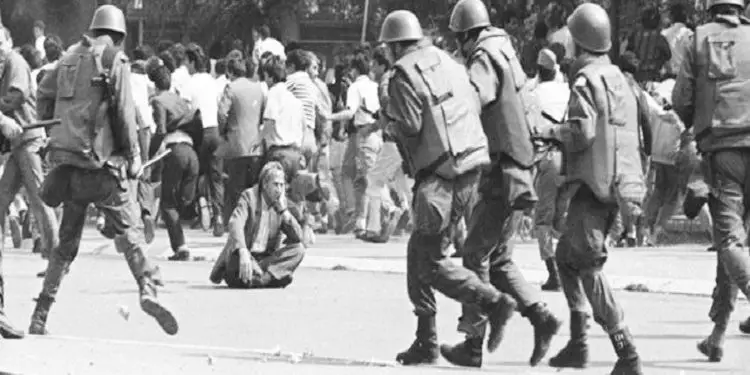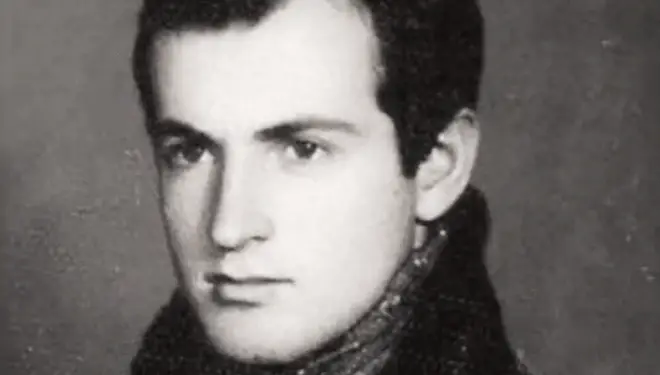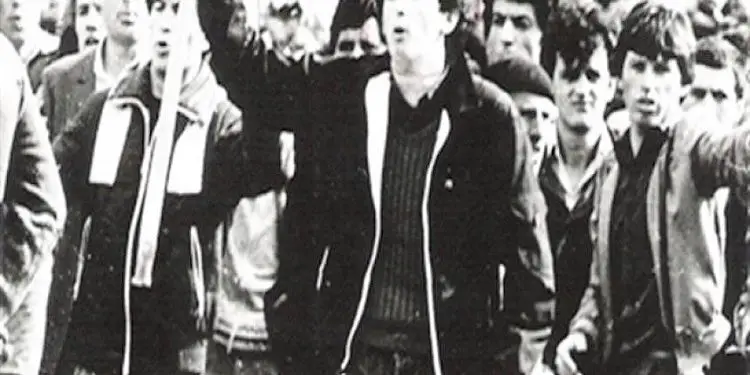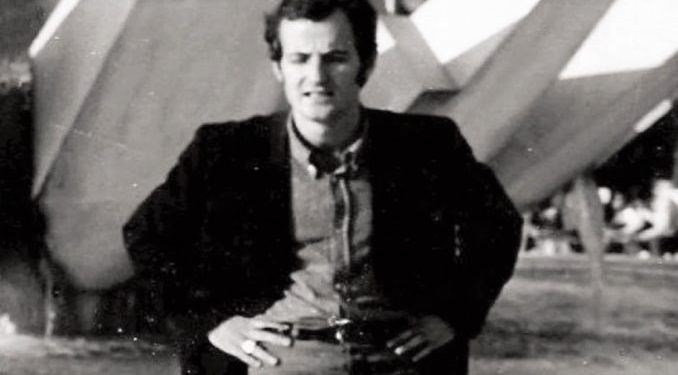By Mehmet Musa
The first part
– The spring of 1981 was an atomic bomb against Yugoslavia and “unity – brotherhood!” –
Memorie.al / We are referring to a Croatian newspaper ‘VUS’, from 1981, where it is written that only the district court in Pejë with judge Ukë Muçaj and the district court in Pristina, with judge Ymer Osaj, have judged on the basis of articles 131, 133 for one year, so many defendants, that the whole of Croatia has not judged for 10 years! Our homeland was deserted; the bravest and most zealous activists were tortured, severely beaten by Albanian investigators and handcuffed. But nevertheless, the war went ahead and for this, they have a strong and great merit, Jusuf Gërvalla and his friends, who worked and acted with emigration outside the Motherland, as well as the government of Tirana, which constantly, with all means, supported the revolutionary youth of Kosovo, before, during and after 1981.
Somewhere from the beginning of July 1981, Enver Topalli came to visit Dukagjin. Since I had travel documents, it was decided that I would go to Germany, and meet Jusuf Gërvalla, to coordinate work and patriotic actions in the future.
I happily accepted that offer, but not knowing his address, I thought I might not be able to meet him, as his location was kept a secret from his friends for security reasons.
However, I started, because my grandfather Musë Mehmeti worked in Munich. At that time there were no telephones and communication options like today. I went to the dormitory where father Musa lived and he was surprised to see me. After staying there for a week, I left Munich for Stuttgart. The journey by train took two hours and upon arriving at the train station in Stuttgart, I began to walk.
After a while I went down the stairs to the basement, there was a big sweet shop and there was a big line of people who wanted to buy ice cream. Suddenly, I saw a familiar face working in the pastry shop. When I got closer, I saw that he was Naim Haradinaj and two other Albanians. I was extremely happy when I saw him, because I assured myself that Naimi would help me with my goal. From the many work at the confectionery, Naimi didn’t even raise his head to look at me, so I decided to get in line to buy an ice cream and then he would look at me. I have known Naim since Deçan. When I got to him, with his usual smile, he greeted me and gave me ice cream and told me not to leave because, when he was freer, we would talk.
I told him that I had heard that Bardhoshi helped students to get hired for two or three months. Naimi asked me if I needed money and a phone number, with which I could call the office where Bardhoshi worked. I impatiently dialed the number and after two rings, someone answered me in German, which I didn’t know a word of, but I heard the last name Gervalla. I introduced myself to him and after asking him about the health of the family, I told him that I have been out for work for two or three months. He asked me if I had an international index and after I answered in the affirmative, he told me which side of the train station to wait and after an hour and a half, he would come there to meet me and, he would come in a car ‘Citroën’ ‘ red color. Not even a full hour had passed, Bardhi and I arrived at the train station, got into his car and after a while, we arrived in Ludwigsburg, right there in the office where he worked, on the second floor.
In the corridor, there were three rooms. On the left was Bardhoshi’s office, in the middle was the office of a Croatian worker and on the right, was the office of a Turk. All three worked for the protection of workers’ rights. After we had a casual conversation, Bardhi was interested in knowing about the current situation in Kosovo. He was interested in every detail, especially for the demonstration of March 26, which was very different from that of March 11, because in this demonstration, the national demands, unlike the social demands, which were on March 11, were revealed. I explained to him the course of that bloody but heroic event. I noticed that sometimes he couldn’t even breathe, because of the interest he had in listening to me. During the conversation, he held a cigarette in his hands, which he sometimes put to his lips and sometimes smelled. He told me that he had quit smoking, and with humor, he told me that it will take another three weeks to make it a month since I quit.
During the conversation, strangers came and opened the door, but when they saw that there were two of us, they went out again. I told him the purpose of why I had gone there. I told him that I wanted to work to earn some money, but mainly to meet with you and your bacalok, to talk about what we can do in these difficult times for our homeland, when all of Yugoslavia and , more than half of the Albanians, are in service and, the args of ‘unity-fraternity’ and Tito’s way. After the initial conversation, he asked me about the international index, which I gave him, and within a week he fixed my work permit and I got a job in a shoe factory called “Salamander” in the city of Konverst’heim. I also took an apartment there, on Adler Street.
After working hours, almost every second day, we visited Bardhoshi in the work office, even to be honest, we went a little too far, because there were a lot of people. Like today, I remember the group of boys who most often visited Bardhoshi and stayed close to him, among whom I remember Naim Haradinaj and Adem Bajramaj from Gllogjani, Hafiz Gagica from Gjilan, Muhamet Imerajn from Isniqi, Haxhi Berisha from Prapaqani, Agron Selen or (Selca) from Struga, Sahit Tofajn from Juniku, Xhafer Durmish and others, whose names I do not remember. Later, I learned that those two other Albanians, who worked in the confectionery, in Stuttgart, with Naimi, one was Haxhi Avdyl Berisha from Prapaçani, grandson of Gërvallaj, and the other was an English language student from Vokshi or Pobergja, his name which I don’t remember. I also accompanied this group of young people, how many days I stayed in Konverstheim.
It is interesting to mention the fact that, despite all the reprisals, violence and terror that the UDB exercised without interruption, towards the brothers and sisters of Naim Haradinaj, imprisoning and torturing his entire family, Naim stood out for his admirable education and behavior. He was punctual in content and conversation, loved and respected by all. He was among the most complete with all human and national virtues and never lacked a smile for his friends. One day, after work, I went to Bardhoshi’s office. I was alone and I expressed my desire to meet Yusuf. He told me that Yusuf also wanted to meet me. He set me the day and time, told me that after a meeting they would have in Favorite in the park, with some students in their dormitory, the three of us would meet. That night, I couldn’t sleep because of joy and curiosity, to meet the leader of the liberation movement of the motherland and impatiently, I was waiting for the day of the meeting.
The day was Saturday, after 13:00, and I don’t remember the date. I arrived at the designated place by 12:30 and looked in the parking lot, where I saw Bardhi’s car. Around 12:50, the two brothers came, like two spring flowers and two nightingales, like two eagle birds, like two statesmen and, like two messengers of freedom, side by side. We greeted each other like brother and brother, warmly and cordially, and the three of us entered Bardhi’s car, Yusuf sat first, in the back, and me and Bardhi, in the front. After the initial formal questions, I introduced myself as follows; my grandmother, was your daughter, Faze Idrizi, the sister of Hasan Idrizi of Gërvallaj, or the aunt of Muje Hasan, then my father, as a child they remember, a cure in our tower, your father, Bardhosh Dina, came Kaçaku, but also Dina Fazlija with a white beard, for Dina Fazlija, says that he was a great farmer.
Yusuf affirmed, saying; yes, yes, I know everything then, we immediately started talking about the situation in Kosovo, especially about the development of demonstrations. He was particularly interested in the demonstration of March 26, which took place on the day, which the reception of the relay of satrap Tito was organized in the city. I told him slowly and calmly, about everything, what I had seen with my eyes and heard with my ears that day, but I didn’t stop without telling him the violence and torture experienced in front of the students’ dormitories, our girls and sisters, by Mehmet Malik’s police. When Yusuf heard these events, his eyes filled with tears. He wiped his tears with a handkerchief and said he was wiping sweat because it was hot in the car. I continued to speak slowly and both brothers listened with special attention and it seemed as if they were not even breathing.
I also told him about the heroic resistance of the students of that day and April 1st, 2nd, 3rd, as well as the determination to realize the demand for the Republic of Kosovo. I also spoke about the mobilization of the UDB, the League of Communists of Yugoslavia and the Security Workers, who were all Albanians. We also talked about the means of information, the daily and periodical press, starting with the newspaper ‘Rilindja’, then Radio and TV-Prishtina, which were put at the service of the defense that; “union-fraternity”, with the south Slavs. We also talked about increasing the number and activating new policemen, selected from among those who knew how to shoot harder with a stick at the people. We talked about the organization of meetings, in every local municipality, to judge and condemn the events in Kosovo, with special emphasis in Isniq, where the official from Belgrade had come.
With that I lost during the conversation, trying to inform Yusuf in every detail, I did not think to speak a single word, if Yusuf did not intervene for Radio-Tirana and Television-Albanian. I explained that; even though the Yugoslav army and police had installed equipment near the border, to prevent listening to the radio and watching the Albanian Radio-Television, the people had found ways to listen to their broadcasts first, to be informed correctly and precisely, about the events in Kosovo. Jusufi, asked me about an article in “Voice of the People”, on April 8 of that year, entitled “Why was police violence and tanks used against Albanians in Kosovo”? I told him that both Radio-Kukësi and Radio-Tirana had broadcast it two or three times a day. I told him that; some of our friends have recorded this article on a tape recorder, to listen to friends who have not had the chance to hear it.
This time, I will not talk more about the conversation with Yusuf Bardhoshi, not that I have nothing to talk about, but I do not want to fall prey to ignorant individuals, who speak with competence and intelligence withered and rusty that Yusuf had this conviction and Yusuf had that conviction, adding that; Jusuf Gërvalla and his friends; Fazli Grajchevci, Kadri Zeka, Rexhep Mala, Zijah Shemsiu, Nuhi Berisha, Metush Krasniqi, Malë Morina, Xhemail Blakaj, Afrim Zhitia, Fahri Fazliu, who devoured the Serbo-Slavic kulčedra for us, with the help of the Albanian-speaking collaborators, were the very hour of Albania, they were Albania itself, they were the messengers of freedom. That constellation, in addition to the liberation war, appealed to those intellectuals, who were sleeping leaning on each other and watching from the window of their ivory chairs, the violence, the massacres and reprisals, the imprisonments and the murders of the sons of our people, before and after 1981, to wake up and not leave Ukshin Hoti alone.
Finally, these intellectuals lost sleep, after ten years and on December 23, 1989, when they took out of their pockets and cut to pieces the tesserae of the League of Communists of Yugoslavia. After we finished the meeting, which lasted about an hour and a half, we said goodbye, leaving that they would both come within the month to where I lived. On their order, I went to the student dormitory, where I spoke about the events in Kosovo, in the assigned room. There, apart from the students I met, there were also workers.
Later I learned that one of them was Sakë Fazli Gërvalla, who was the son of Jusuf e Bardhoshi.
The days passed quickly, we did not leave Bardhoshin alone, whether necessary or not, out of curiosity to hear some news from Kosovo, brought by the emigrants, but also to hear some advice from him. From that group of young men, I was also associated with Sahit Tofajn, a valuable, patriotic, brave and loyal man. He was from Junic.
My employment contract expired at the end of October. One day after work, I took with me a bag of empty water bottles and set off for Ludwigsburg, which was only one station away from Konerstheim, and reached Bardhoshi in the office, to whom I told him that my days in Germany were ending. they were finishing me and that after staying two weeks with my father in Munich, I would return to my homeland. He told me that at the end of September, on a working day, they would come to my apartment, and we would say hello. He was impressed by the bag of empty bottles, what I needed, and I replied that; at the train station, here in Ludvigsburg, there was a tap that flowed water without interruption and it was written that it was drinking water (Trink water). There I fill the bottles and use them to drink.
I felt and somehow understood that he was surprised and upset by what he heard from me. It was a working day that day, at the end of September; I had taken leave to be free that day and was waiting for guests. I was very cramped because I had neither cups, nor jezes, nor coffee to drink, from a coffee, even water I had provided from the croft in Ludwigsburg. They arrived around 2:00 p.m., on Adler Street. Upon entering, Bardhoshi said: “Live on the path of the eagle.” I was surprised, because I didn’t know what he meant, but he explained to me that; the name of the street where I lived, Adler, in Albanian, was translated eagle.
I didn’t have a table or a chair and we sat on the bed.
“We came to say hello, since you will return to Kosovo. Make them forgive all of Kosovo, from us emigrants. The situation in our homeland is sad, because the invaders and collaborators filled the prisons full of activists of the national issue. They lay waste that land, but we do not kneel down. Our fight is right and must continue, even though we face all kinds of obstacles, intrigues and traps that the puppies of the UDB devise, because there is no one more right than us, to fight for freedom and unity, that’s why I am 100% convinced that victory is ours.
Yugoslavia, one day, will fall like a dead animal to the ground. The request “Kosovo Republic” will become a reality one day not far away, because the people have said their word: Republic of the constitution, here’s to hate, here’s to war! In the homeland, we need an organization as secret and conspiratorial as possible, against the beasts of the Carpathians. At the same time, we are strong and determined, on the road to freedom, because we have unsparing help, even the mother country, mother Albania. We who are in exile, as much as we are and all of us are united as one body, towards the realization of the centuries-old aspirations of our people”, concluded Jusuf Gërvalla, giving me the floor, and said; now tell me your opinion too.
It was difficult for me to speak because there was an endless mountain of distance between us. His optimism, that at any cost we will win, was a powerful incentive that made me speak. I told him that; our centuries-old enemy crippled us a lot, imprisoning almost all illegal groups that acted for the good of the Motherland. But the enemy is always the enemy. The bad thing is that many Albanians have put themselves in the service of these enemies and serve them with the greatest zeal, to lick a bone. The raids, day and night, on the houses of suspects such as nationalists, irredentists and enemies of the union-fraternity, are carried out only by the workers of the Security, who are Albanians. Maltreatment, beatings, animal torture is done only by Albanians, in the SUP of Deçan and Peja. I mentioned all those black executioners, whose names I knew, one by one, and who are still alive today.
After that, Yusuf intervened, saying that the more the torture and reprisals increase, the more the hatred and resistance of the people increases, the more the organization of the people increases, against the bloodthirsty Titist and fascist regime. I told Yusuf about the friends I had met in studies and, especially in the spring demonstrations, telling him that they are ready for any action. I told him that we have constant contact with them and that they are people of the same ideal – I added. He did not ask me their names, but said; protect each other, be careful and keep the secrets like the eyes of the forehead. Ahead of us is March of the coming year and it is good that; as a sign of the first anniversary of the blood demonstrations, make efforts to organize demonstrations, especially in Pristina and, where possible, in other municipalities. Our fight must be continued at any cost, and undoubtedly the victory will be ours.
With these words, the meeting ended, instructing me, among others, that when I go to Pristina, to the student dormitories, to take three deep breaths, with the air of Kosovo, for him (Jusuf). Then Bardhoshi asked me for the address and phone number of the dormitory where father Musa lived in Munich, promising me that he would go visit him. He asked me not to write down his phone number anywhere, but to keep it in mind, to avoid any surprises. After that we greeted each other, hugging each other tightly. I could not imagine that only after 4 months, these two stars would die in the service of the cause of the Motherland, when the Motherland needed them more than anything. Memorie.al
The next issue follows




